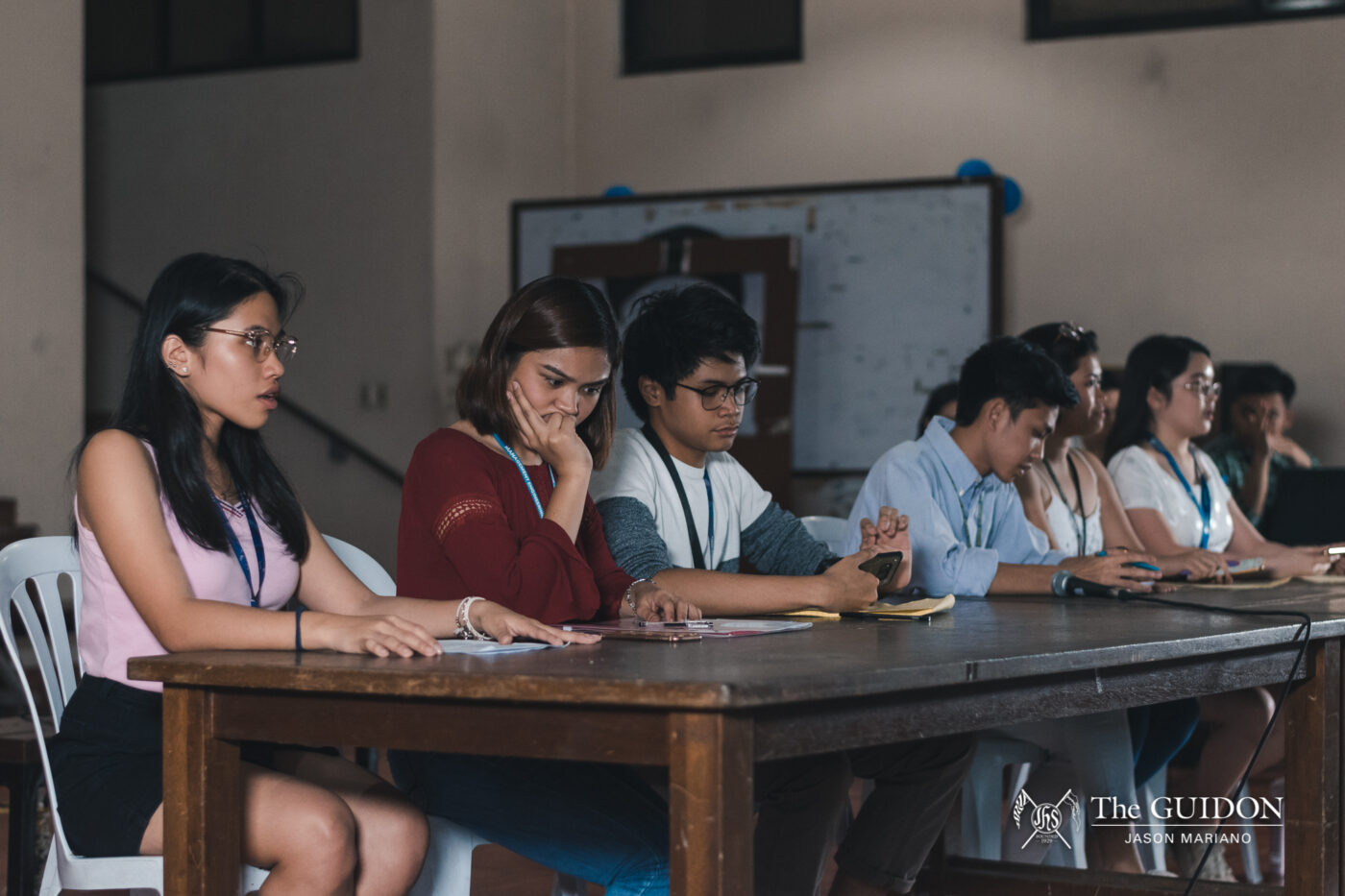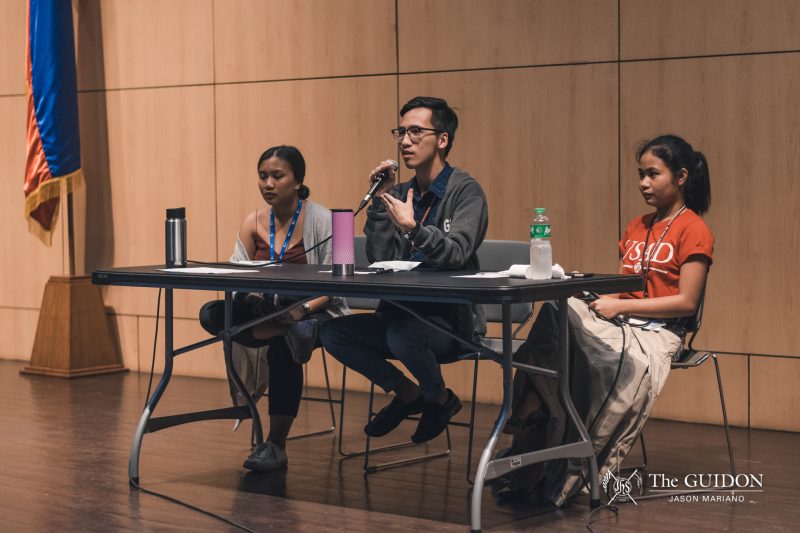STUDENT RIGHTS and welfare emerged at the forefront of the 2018 Sanggunian School Representatives (SR) Debates at the Colayco Pavilion on March 12.
Issues on mental health and sexual harassment were discussed as the SR candidates answered a combination of online-pooled queries from students and questions from the host and panelists from The GUIDON and Matanglawin.
Present at the debates were SR candidates from the Green Coalition of the Ateneo: James Carreon for the School of Social Sciences (SOSS), Bea Gruta for the School of Science and Engineering (SOSE), and Bianca Pamfilo for the School of Humanities (SOH).
Candidates from the Union of Students for the Advancement of Democracy (USAD) were also present, namely Rige Encarnacion and Mikaela Bona for the John Gokongwei School of Management (JGSOM) and SOSS respectively. Independent candidate Gomer Abesamis for SOSE also participated.
The SR debates was the first part of the 2018 Sanggunian Debate series, and was followed by the Presidential and Vice Presidential Debates the following day.
Student rights and welfare
The SR candidates faced tough questioning on issues such as mental health, gender-related topics, and anti-sexual harassment.
Pamfilo was asked about her thoughts on the implementation of gender-neutral restrooms on campus.
She responded in favor of it, saying that if the Lesbian, Gay, Bisexual, and Transgender (LGBT) sector feels that it is “appropriate for them to have a bathroom [for themselves].”
Meanwhile, JGSOM SR candidate Encarnacion was asked on how she would shorten the process of filing a sexual harassment case. She said that the quality of the services, and not just the streamlining of the process, should be the priority.
“If gusto mo i-streamline nang i-streamline, baka lang masaktan ‘yung student. We should focus more on the student and what we can offer the student (If you just want to keep streamlining [the process], the student might just get hurt. We should focus more on the student and what we can offer the student),” she said.
To help in handling sexual harassment cases, Encarnacion plans to enforce the Student Rights and Welfare (STRAW) Desk and a STRAW Committee, which were initiated by the current Sanggunian, but did not materialize due to the lack of manpower.
In response, Bona said that she would ensure that “counselling and legal services will be available” for victims of sexual harassment. She also stressed the need for a clear understanding of what constitutes sexual harassment, which is stated in the memo of Vice President for the Loyola Schools Maria Luz Vilches, PhD on procedures for filing and handling sexual harassment cases in the Loyola Schools.
Carreon also said that the enforcement of a sexual misconduct policy “goes back to the Magna Carta [of Undergraduate Student Rights]” and asked, “How can these problems be addressed if the [administration] does not recognize them?”
The creation of policies for persons with disabilities and those suffering mental health problems was also brought up during the debates. Gruta said that more data should be gathered to help these students and that the Sanggunian should tap organizations and institutions in doing so.
“The Sanggunian should first focus on getting data on how to help,” she said. “We should provide more support for them by providing more awareness about their struggles.”
Bona stressed that addressing mental health issues on-campus can be done through “strengthening what the [administration] does” for Students at Risk. Moreover, she said that institutions such as Center for Family Ministries (CeFaM), a donation-based institution under the Loyola School of Theology, is available for those seeking psychiatric help, as it has counselling services and seminars.
Carreon added that mental health services on campus should be subsidized “to help the students beyond spotting those at risk.”
School-specific concerns
The debate also shed light on various problems within the University which fall under the jurisdiction of the SR candidates’ specific schools.
Pamfilo was asked about how she can assure that SOH students are equipped with practical knowledge when they graduate, given that their curriculum is heavily reliant on theory.
She answered that practical knowledge could be promoted in the humanities by emulating the Fine Arts program that provides workshops to students. According to her, she will do this by lobbying to integrate workshops in the SOH curriculum and implementing study sessions that will discuss topics beyond theory, such as technical writing, among others.
A question was also raised about how the Integrated Ateneo Formation (InAF) program could be more discipline-based for SOH students.
Pamfilo explained that the InAF program could serve the humanities better through “bridging programs [of the humanities]” to the communities, as well as enhancing their “capacity to improve the program by letting [the students] have valuable output with the partner institutions.”
SOSE SR candidates were also pressed with issues regarding the shortage and old age of laboratory equipment.
Abesamis admitted that the equipment available for students “is not in the best of shape.” He then said that it could be remedied by talking to the specific departments about funds for improving the condition of laboratory equipment.
As for Gruta’s proposed solution, she said that she will lobby a resolution for student evaluation on laboratory equipment that will allow students to provide input on their experiences in the laboratory, as well as with the laboratory equipment.
Abesamis and Gruta were also asked regarding the improvement of the working conditions of laboratory technicians whose jobs entail being exposed to harmful chemicals.
Both candidates agreed that the technicians deserve a hazard pay for compensation, and that the problem should be lobbied to the departments first before the administration.
Meanwhile, Encarnacion addressed the concern about the contractualization of workers at the JGSOM Student Enterprise Center (JSEC), saying that there is a need to “create spaces for dialogue between the administration, the [JSEC stall] owners, and the workers.”
She also expressed that there is a need to address the rent prices of JSEC as well, because according to her, workers are not given enough compensation because of expensive rent. She then proposed to appoint a deputy for student business and enterprise to help mediate the issue.
Points of contention
Following Encarnacion’s response on how she plans to address the contractualization issue, a point of inquiry from the Green Coalition’s Vice Presidential candidate Niels Nable asked if she is willing to implement her proposal before she is elected. Nable was part of the audience during the event.
Encarnacion replied with a yes, and mentioned the efforts being made by current JGSOM representative Alec Lim to address the issue such as lobbying for financial transparency on rent expenses, and submitting proposals to “fix the system.”
A heated exchange emerged when Nable then questioned how Encarnacion will start executing her plans, given that she, as well as other USAD members were not in attendance during a meeting intended to discuss solutions for the said issue. Nable reported that attendees included incumbent JGSOM representative Alec Lim, Cuisina President Cess Yu, Ateneo Lex President Jem Capeding, and former Task Force SIKHAY Coordinator Luis Enriquez.
“Tanong ko lang bakit wala kayong napadala doon kahit marami kayo sa party niyo? [Walang pumunta] kahit isa (I would just like to ask why you were not able to send a member from your party even if there is a lot of you [in USAD]? Not a single person [attended the meeting]),” Nable asked.
USAD Secretary General Sydney Gil then approached the microphone and joined the discussion. According to him, “USAD has raised this issue during the [Magtanong sa VP at mga Dekano] consultation” and that they “have always worked regarding the issue.”
However, debate moderator Briane dela Peña intervened saying that it was an SR debate, and called for Gil to “give [Encarnacion] the floor and the privilege to represent USAD in the debate.”
Encarnacion then clarified that USAD is making efforts for labor rights, and asked Nable to discuss the issue with USAD afterwards. She added that for the time being, what they should focus on is what they can do in the Sanggunian.
Meanwhile, following Bona’s suggestion of appointing deputies for fixing the issue on SOSS students’ tuition fees during internship periods, Carreon argued that there is a lack of manpower in the Sanggunian which which he said may prevent Bona to do so.
Bona claimed that manpower is just a small problem and that “it will not stagnate a lot of things in the Sanggunian.”
However, Carreon disagreed, saying that it is the primary reason why committees are not filled and why projects such as STRAW are not executed successfully by the Sanggunian.
After several exchanges, incumbent SOSS representative Dasha Uy intervened to tell both candidates to lay down the issue and focus on the more pressing concerns, saying that they were “wasting time” on the issue of manpower, as SOSS had a large office during her term.
“I think you’re underestimating the power of the student body here. [If] that’s a concern for them, we’re [going to] mobilize for it. So let’s stop talking about manpower and start talking about the issues that actually matter,” she said.
Issues within Sanggu
As the candidates laid down their general platforms and aims for their specific schools, internal Sanggunian matters were also tackled in the debates.
Matanglawin Editor-in-Chief Micah Rimando asked a question about the importance of mobilizations to the future Sanggunian officers, and how they can mobilize the student body for future causes.
Gruta said that there must be a follow through inside campus regarding Sanggunian’s involvement on mobilizations.
“Labas nang labas ang Sanggunian, pero anong nangyayari kapag bumabalik na? (The Sanggunian goes out [to mobilize] a lot, but what happens once they get back?)” she questioned.
Abesamis and Pamfilo shared the same sentiment that students must be engaged in educational forums so that they would recognize the relevance of mobilizations. Bona also agreed by expressing the need to “brief and educate the people through forums and kapihan sessions.”
Carreon, on the other hand, clarified the need for the Sanggunian to sufficiently inform the students about social issues.
“[The] Sanggunian has the responsibility to ensure that not only one side of the story is being heard,” he said.
For Encarnacion, a good starting point within JGSOM is “contextualizing sociopolitical issues” and “promoting the advocacies of home organizations.”







